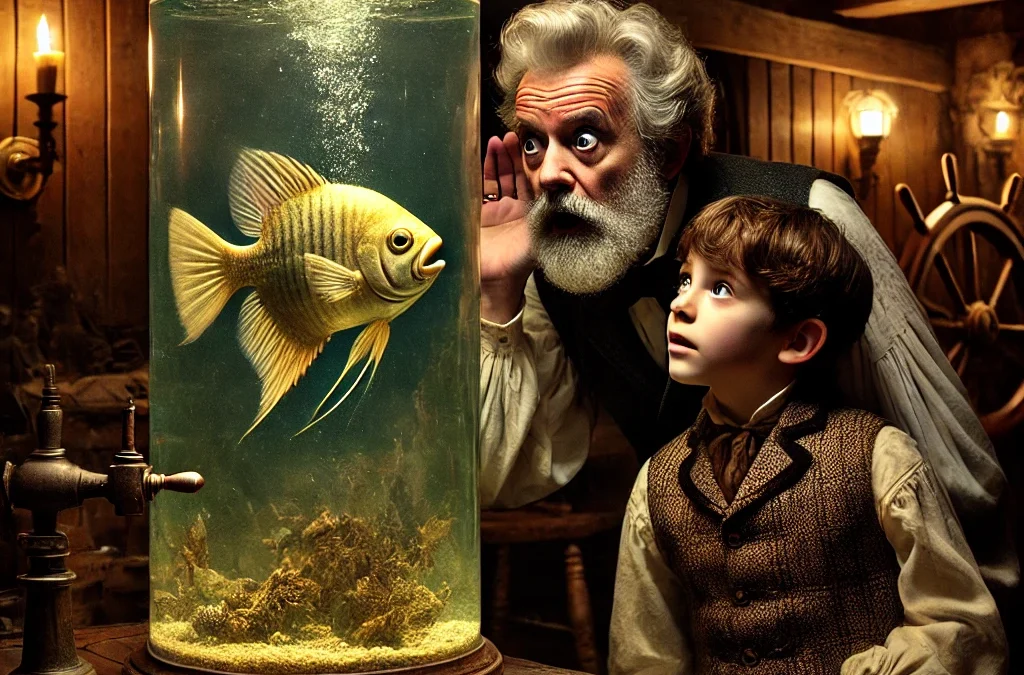※カラフル対訳で紹介している作品はすべてパブリックドメインです。
このサイトで使われている作品のすべては著作権の切れた名作などの全文を電子化して、インターネット上で公開しているProject Gutenberg(プロジェクト・グーテンベルク)、LibriVox(リブリヴォックス、朗読図書館)の作品を出典としています。
翻訳者:satoyayo4080
After he had listened to the crabs for a while with no success,[失敗に終わって] he put the fidgit into the tank and began to listen to that.
先生はしばらくカニ(のおしゃべり)に耳を傾けていたがうまくいかず、今度はフィジットを水槽に入れ、それに耳を傾け始めた。
I had to leave him at this moment to go and attend to[精を出す, 専心する] some duties[職務, 務め] on the deck. But presently I heard him below shouting for me to come down again.
この時、私は甲板に用事があって行かなければならず、先生の側を離れていたのだけど、まもなく下から、先生がすぐに降りくるようにと呼ぶのが聞こえた。
“Stubbins,” he cried as soon as he saw me—“a most[とても] extraordinary[異常な] thing—Quite unbelievable—I’m not sure whether I’m dreaming—Can’t believe my own senses.[感覚] I—I—I—”
「スタビンズ君」先生は私を見るやいなや叫んだ。「とても驚くべきことだ。まったく、信じられないよ。夢を見ているんじゃないかと思うほどだ。自分の耳が信じられないよ。わしは、わしは…」
“Why, Doctor,” I said, “what is it?—What’s the matter?”
「どうしたんですか、先生」と私は言った。「何があったんですか?」
“The fidgit,” he whispered, pointing with a trembling[震える] finger to the listening-tank in which the little round fish was still swimming quietly,
「フィジットが」と、先生は小さな丸い魚がまだ静かに泳いでいる、おしゃべりを聴き取るための水槽を震える指でさしながらつぶやいた。
“he talks English! And—and—and he whistles tunes—English tunes!”
「英語を話しているんだ。それに、それに、口笛を吹いているんだ。英語の曲を!」
“Talks English!” I cried—“Whistles!—Why, it’s impossible.”
「英語で話しているですって!」と私は叫んだ。「口笛を吹く!まさか、ありえないですよ」
“It’s a fact,” said the Doctor, white in the face with excitement.
「本当なんだ」と先生は興奮で顔を真っ青にして言った。
“It’s only a few words, scattered, with no particular[特有の] sense[意味] to them—all mixed up with his own language which I can’t make out yet.
「特に意味もなく、ほんのいくつかの英単語にすぎないが、こいつの言葉のなかに散りばめられているんだ。その言葉はわしにはまだ理解できないがね。
But they’re English words, unless there’s something very wrong with my hearing—And the tune he whistles, it’s as plain as anything—always the same tune.
だが、(間違いなく)英語じゃよ。わしの耳がよほど悪くなければね。それに、口笛で吹いている曲は、何よりはっきりとしている。いつも同じ曲だからね。
Now you listen and tell me what you make of[考える, 理解する] it. Tell me everything you hear. Don’t miss a word.”
さぁ、君も聞いてみて、どう思うか教えてくれ。聞こえたものはすべて教えて欲しい。ひとことも聞き逃さないようにな」
I went to the glass tank upon the table while the Doctor grabbed[ひっつかむ] a note-book and a pencil.
先生がノートと鉛筆を取りに行っている間に、私はテーブルの上のガラス張りの水槽の前へ行った。
Undoing[ほどくこと] my collar I stood upon[~に立つ] the empty packing-case he had been using for a stand[台] and put my right ear down under the water.
襟を外し、先生が踏み台として使っていた荷造り用の空箱の上に立ち、右耳を水の中につけた。
For some moments I detected[~を発見する] nothing at all—except, with my dry ear, the heavy breathing of the Doctor as he waited, all stiff[〈動作・態度など〉堅苦しい] and anxious, for me to say something.
しばらくは何も聞こえず、ただ、水につけてない方の耳[乾いた耳]で、私が何と言うかを硬くなり心配しながら待っている、先生の重い息遣いが聞こえるだけだった。
At last from within the water, sounding like a child singing miles and miles away, I heard an unbelievably thin,[〈音声など〉かぼそい] small voice.
そしてついに、水の中から、まるで何キロも先の子供の歌声のように、信じられないほど微かに、小さな声が聞こえてきた。
“Ah!” I said.
「あっ!」と私は言った。
“What is it?” asked the Doctor in a hoarse, trembly whisper. “What does he say?”
「どうしたんだい?」と先生は、震えるしゃがれ声でひそひそと尋ねた。「何と言っているんだい?」
“I can’t quite make it out,” I said. “It’s mostly in some strange fish language—Oh, but wait a minute!—Yes, now I get it—
「よくわかりませんが」私は言った。「たいていは、変な魚の言葉で… あぁ、でもちょっと待ってください!うん、わかりました。
‘No smoking’…. ‘My, here’s a queer one!’ ‘Popcorn and picture postcards here’…. ‘This way out’…. ‘Don’t spit’—What funny things to say, Doctor!—Oh, but wait!—Now he’s whistling the tune.”
『禁煙』『あら、変なのが来たわ!』『ポップコーンと絵はがきはこちら』『こちらが出口…』『つばをはかないで』まったく、おかしなことを言っていますよ、先生!あぁ、でも待って!今度は口笛を吹いています」
“What tune is it?” gasped the Doctor.
「何の曲なんだい?」と先生は息をのんだ。
“John Peel.”
「ジョン・ピール」
“Ah hah,” cried the Doctor, “that’s what I made it out to be.” And he wrote furiously in his note-book.
「あぁ、まさに」と先生は叫んだ。「わしもそう思ったんだ」そして、先生はノートに猛然と書きつけた。
I went on listening.
私は耳を傾け続けた。
“This is most extraordinary,” the Doctor kept muttering to himself as his pencil went wiggling[ぴくぴく動かす] over the page—“Most extraordinary—but frightfully[恐ろしく] thrilling. I wonder where he—”
「これはまったく驚くべきことだ」と先生は鉛筆を(ページに)走らせながら何度もつぶやき続けた。「とんでもないことだが、ものすごくスリリングだ。いったいどこで…」
“Here’s some more,” I cried—“some more English…. ‘The big tank needs cleaning’…. That’s all. Now he’s talking fish-talk again.”
「また聞こえました」と私は叫んだ。「また英語です。『大きな水槽は掃除が必要だ』それだけです。また魚の言葉を話しています」
“The big tank!” the Doctor murmured frowning in a puzzled kind of way. “I wonder where on earth he learned—”
「大きな水槽だって!」と先生は困惑したように顔をしかめながら呟いた。「いったいどこで覚えたんだろう…」
Then he bounded up out of his chair.
それから先生は椅子から飛び上がった。
“I have it[(答えなどが)わかる],” he yelled, “this fish has escaped from an aquarium. Why, of course! Look at the kind of things he has learned:
「わかった」と先生は叫んだ。「この魚は水族館から逃げ出したんだ。なんだ、当然ではないか!彼が覚えた言葉を見てごらん。
‘Picture postcards’—they always sell them in aquariums; ‘Don’t spit’; ‘No smoking’; ‘This way out’—the things the attendants say.
『絵葉書』-というのは水族館でいつも売っている。『つばをはかないで』『禁煙』『出口はこちら』ー案内役が言うことだ。
And then, ‘My, here’s a queer one!’ That’s the kind of thing that people exclaim[(喜び・怒り・驚きなどで突然)強い語調で言う] when they look into the tanks. It all fits. There’s no doubt about it, Stubbins: we have here a fish who has escaped from captivity.[監禁, 束縛]
それから、『ほら、変なのがいるよ!』水槽を覗き込んだ人が言うことだ。すべてピッタリだ。間違いないよ、スタビンズ君。ここにいるのは、(水族館の)束縛から逃れた魚だよ。
And it’s quite possible[可能性がかなり高い]—not certain, by any means, but quite possible—that I may now, through him, be able to establish[成立させる, 打ち立てる] communication with[と通信する] the shellfish. This is a great piece of luck.”
これで、わしは今やこの魚を通して貝と会話をすることがー決して必ずというわけではないが、できそうだ。これはとても運が良い」

